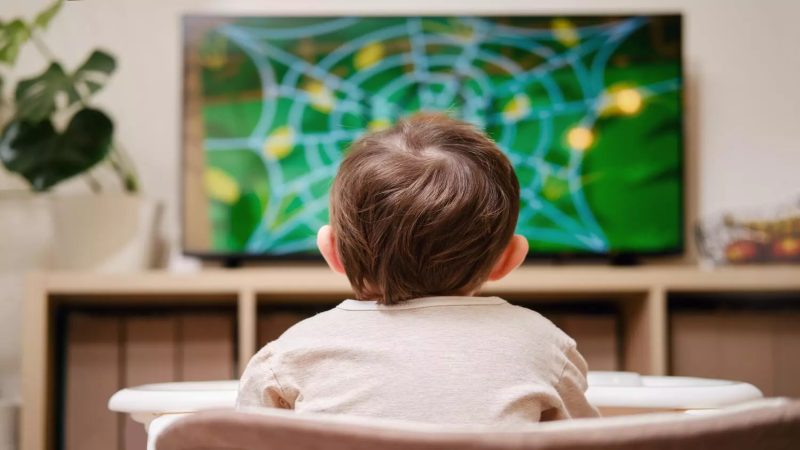
With screens surrounding us everywhere, parents are overwhelmed about its impact on their little ones. Are you one of them? Is your toddler a TV addict? Are you concerned about how screen time impacts their physical and mental development? In today’s fast-paced digital world, getting hooked to television or any other forms of screen is not unusual. But how much is too much?
Here, we will explore the potential challenges of excessive TV watching on toddlers and how you as a parent can put a check on this habit. Making informed decisions about your toddler’s media consumption is important for their healthy habit formation and appropriate emotional regulation. Let’s find out more about what to do if your toddler is a TV addict.
Video – TV Addiction In Toddler
Should Your Toddler Watch TV?

This question stirs a constant debate among parents, teachers, and child mental health experts. While some argue that certain educational and cartoon programs might be beneficial for the toddler, most programs are either addictive or do not provide any helpful content to the toddler.
TV addiction is a pressing reality for many parents, who struggle to redirect their toddlers to more enriching activities. Toddlers and young kids today are increasingly fixated on television, often watching multiple shows without pause. When denied screen time, toddlers may throw tantrums or become inconsolable.
This dependency on TV highlights a concerning trend where kid’s lives revolve solely around screen entertainment. Research studies have shown that increasing the amount of screen time impacts language development in toddlers below 5 years (1a). Moreover, study findings also claim that excessive TV watching by toddlers can lower the quality of parent-child interaction, leading to poor language usage and social skills (1b).
How Much TV is Good For a Toddler?
As per the guidelines of American Academy of Pediatrics (AAP), toddlers under the age of 2 years should avoid watching TV (2). Moreover, kids below 4 years should not watch television for more than 1-2 hours in a day.
Therefore, for toddlers, limited exposure to TV is recommended. For toddlers 18 months-24 months, screen time should be limited and they should be encouraged to have more active play time that can promote good physical and mental health. This way you can prevent your toddler from becoming a TV addict.
How to Know if Your Toddler is Addicted to TV?

Being a parent, you may feel overwhelmed and helpless when your toddler throws tantrums or screams excessively when denied TV viewing. Their loud screams and shouts rob your patience too soon. However, there are certain key signs that you can use to identify whether your toddler is a TV addict or not-
- Your toddler refuses to turn off the television
- Screams or whines constantly when they were denied TV watching
- Your toddler shows no interest in other playful activities
- They may try to put on the TV when parents are not around
- Toddler finds it hard to stay away from TV and wants to put on the device
- Prefers solitary TV watching and avoids interaction with parents and siblings
- Refuses to go out to the park and play, in case they miss their favorite cartoon
- Persistent headaches, watery eyes can be seen due to excessive television watching
- Sleep issues and bad dreams can occur due to excessive TV viewing (3)
What Are The Dangers of Watching Too Much TV For Toddlers?

If the toddler is glued to the television all day or starts to throw tantrums when denied watching, then parents need to consider their decision. Some of the dangers of watching too much for toddlers TV are listed below-
- Poor cognitive development because there is limited engagement in interactive learning activities that actually boosts sensorimotor development (1c)
- Increases risk of obesity in toddlers
- Irregular sleep patterns can cause irritability in toddlers
- Toddlers who watch TV more suffer from lack of focus and concentration issues
- Excessive TV watching impacts early reading and math skills in toddlers (4)
- Toddlers who watch TV have fewer opportunities to interact with family in fun activities
- Toddlers exposed to constant background TV sounds may experience delayed speech, possibly due to difficulty hearing others in the household
Top 10 Tips to Break Your Toddler’s Screen Habits
To decrease your toddler’s TV exposure, you should set a structured routine that ensures limited screen time and seeing only quality content. Moreover, you can offer them other fun-filled activities to engage with. Some of the tips to follow include the following-
1. Setting Limits

As a parent, it’s crucial that you set limits on your toddler’s screen time. Just communicate openly about the time limit. Also let them know the rules and consequences if not followed. You can also offer TV allowances in the form of extra viewing time on Sundays if they put off the television on time.
2. Be Choosy About What They Can See
Choose programs that are educational and friendly. You can allow carton programs, or programs on birds and animals, craft activities, drawing, English rhymes for the toddler. All the programs should be age-limiting and your tiny tot should enjoy it.
3. Practice What You Preach

If you want your toddler to limit TV watching, you should do the same. Set limits on your binge watching and avoid seeing anything on the TV that can impact your little one emotionally. You should set an example yourself and give up your extra TV hours for the sake of your toddler.
4. Have Outdoor Activities

If your toddler spends too much time indoors, they’ll likely turn to the TV. Encourage outdoor activities like cycling or short walks in the neighborhood or playing in the park. Help them play with other kids to promote physical activity and deter TV watching.
5. Help Them Take up a Hobby
Another way to distract your toddler from television watching is by helping them develop a hobby. Put colors and drawing sheets in front of them and allow them to scribble, draw, and paint to their heart’s content.
6. Make Arrangements For Playdates

Arrange playdates to foster social interaction and reduce screen time. Invite other children over for fun activities, such as games, crafts, or outdoor play. By organizing play dates, you offer opportunities for your toddler to engage in both enriching experiences and develop vital social skills.
7. Teach Them Small Household Chores
Engage your toddler in helping you with small household tasks such as watering the plants, or picking up the toys after playtime. These activities not only keeps them away from the TV but also develops a sense of discipline and responsibility in them.
8. Story-telling Sessions

This is a delightful alternative that your tiny tot will readily accept to be a part of. Read stories to them and keep them occupied for some time. This also helps to nurture their listening skills, helps in improving focus.
9. Choose Alternative Activities
As a parent, you can divert your toddler’s attention from TV by offering them alternative activities. Easy ones among them are arranging the alphabets and numbers in an order, counting the toys that are there in their toy basket, or sensory activities like listening to English rhymes and repeating them correctly.
10. Keep Your Television Out of Sight

Sometimes when television is kept in a room where the toddler doesn’t play or get into very often, it reduces their screen time. Keeping TV in a high cabinet can also lessen watching. Your toddler may not like to see a TV that is hurting their neck.
TV Watching Tips For a Toddler’s Parents

There are certain pointers that parents should consider before allowing screen time to their toddlers-
- Set clear rules of time and content to be viewed
- To prioritize educational, age-specific content only
- Encouraging the toddler to do other activities such as outdoor play, reading books
- Not allowing the toddler to watch TV while eating or during nap times
- Parents should hold off introducing television or any other screens as much as possible
- Put off the television when not in active use
- Parents should limit their own screen time to set a good example for their toddler
Determining ‘Is your toddler a TV addict?’ requires careful observation and proactive measures. By monitoring screen time and encouraging diverse activities, parents can mitigate excessive TV viewing habits. With guidance, tiny tots learn balanced media consumption very early in life.
FAQ’s
1. What Are The Symptoms of TV Addiction Withdrawal?
The symptoms of TV addiction withdrawal may include constant cravings to watch the TV, mood swings, temper tantrums, etc. The toddler may show agitation and boredom as well.
2. How do You Break a TV Habit?
To break a TV habit, you need to set clear limits on screen time. Moreover, encouraging other activities such as reading, outdoor playing, riding a cycle can divert the toddler’s focus away from the TV.
3. Is TV Damaging to Kids?
Yes, excessive TV viewing is damaging to kids as it may cause delays in speech and cognitive development. Additionally, excessive TV exposures can impact sleep quality, poor emotional regulation, and poor grasp of academic ideas.
4. What Age is ok For TV?
The American Academy of Pediatrics recommends avoiding screen time for children less than 18 months. For toddlers aged 18 to 24 months, limited high-quality programming is acceptable but with parental control. For 2 to 3 year toddlers, limited TV watching with quality content is only permitted.
References
- Muppalla SK, Vuppalapati S, Reddy Pulliahgaru A, Sreenivasulu H. Effects of Excessive Screen Time on Child Development: An Updated Review and Strategies for Management. Cureus. 2023 Jun 18;15(6):e40608. doi: 10.7759/cureus.40608. PMID: 37476119; PMCID: PMC10353947. – https://www.ncbi.nlm.nih.gov/pmc/articles/PMC10353947/
- American Academy of Child and Adolescent Psychiatry – https://www.aacap.org/AACAP/Families_and_Youth/Facts_for_Families/FFF-Guide/Children-And-Watching-TV-054.aspx
- Helm AF, Spencer RMC. Television use and its effects on sleep in early childhood. Sleep Health. 2019 Jun;5(3):241-247. doi: 10.1016/j.sleh.2019.02.009. Epub 2019 Apr 13. PMID: 30987948; PMCID: PMC6581597. – https://www.ncbi.nlm.nih.gov/pmc/articles/PMC6581597/
- Canadian Paediatric Society, Digital Health Task Force, Ottawa, Ontario. Screen time and young children: Promoting health and development in a digital world. Paediatr Child Health. 2017 Nov;22(8):461-477. doi: 10.1093/pch/pxx123. Epub 2017 Oct 9. Erratum in: Paediatr Child Health. 2018 Feb;23(1):83. doi: 10.1093/pch/pxx197. PMID: 29601064; PMCID: PMC5823000.– https://www.ncbi.nlm.nih.gov/pmc/articles/PMC5823000/

